Reports: Thai noise campaign having dangerous effects on children
Child right’s advocates have warned that recent psychological warfare tactics from the Thai border are having severe impact on the wellbeing of Cambodian children. Since the night of October 10, loud, eerie ghostlike sounds have been broadcast across the border, at Bateay Meanchey province’s Prey Chan and Chouk Chey villages, causing fear, stress and sleepless nights for residents.
The sounds are reportedly being broadcast by Thai influencer and nationalist Kan Jomphalang.
Child right’s advocates have warned that recent psychological warfare tactics from the Thai border are having severe impact on the wellbeing of Cambodian children. Since the night of October 10, loud, eerie ghostlike sounds have been broadcast across the border, at Bateay Meanchey province’s Prey Chan and Chouk Chey villages, causing fear, stress and sleepless nights for residents.
The sounds are reportedly being broadcast by Thai influencer and nationalist Kan Jomphalang.
According to Yan Lay, executive director of the Child Rights Coalition Cambodia (CRC-Cambodia), the continuous sounds from Thailand have affected children’s mental health and education, leading to symptoms of trauma and anxiety.
“First, it affects children’s mental health. When there is noise — especially frightening and unsafe sounds — it disrupts their sleep. Loud and scary noises often cause children to have nightmares and panic attacks at night,” Lay told The Post.
He said that many children in border villages have shown signs of stress, anxiety and depression, with some crying and becoming restless at night.
“These disruptions also impact children’s daily education. Many are afraid to go to school in the morning or evening. When they are scared, they cannot focus on their studies,” he added.
Lay noted that some parents have kept their children home out of fear, and the lack of accurate information from adults or authorities has worsened confusion among young people.
“Children may continue to share what they hear with friends who haven’t experienced the noise themselves, spreading fear and misinformation,” he said.
He urged authorities, parents, teachers and community leaders to communicate clearly with children about the source of the noise and create spaces for them to express their feelings.
“Communities should have discussions or activities where children can share their fears. This can help reduce anxiety,” he said, adding that both Cambodian and Thai civil society groups should strengthen cooperation to share factual information.
Lay also called for stricter control of misleading content on social media, warning that exaggerated or false reports could deepen fear and panic among vulnerable groups.
At the community level, Pov Boeun, chief of Prey Chan village, in O’Beichon commune, Ou Chrov district, said that the nightly sounds — described as “ghostly” and “unnatural” — have disrupted life along the border.
“It is like a haunting sound, especially when there is a ghost’s funeral. The actions of the Siamese are those of bad people — to put it bluntly, they are childish and lack humanity,” he said.
“It makes us unable to rest, especially the young children who need plenty of sleep. But we do nothing in response,” Boeun told The Post.
Venerable Hak Sienghai, founder of Buddhism for Education in Cambodia (BEC), condemned the psychological disturbance as a moral and spiritual violation.
“I feel deeply sorry for Buddhists and all of our people living along the border. Our enemies are causing hardship for people who wish to live in harmony. Now they are using ghastly noises to harm our citizens,” he told The Post.
He added that such acts, if state-backed, amount to persecution and a violation of human rights, and warned that “those who commit such deeds will bear sins in their hearts”.
The Cambodian Human Rights Committee (CHRC) has formally appealed to the UN High Commissioner for Human Rights (OHCHR) to investigate what it described as “psychological intimidation and harassment” by the Royal Thai Armed Forces.
In an October 11 letter, CHRC president Keo Remy explained that the noises included wailing voices and aircraft engines, deliberately directed at Cambodian communities near the frontier.
“These sounds, described as intense, high-pitched noises lasting for prolonged periods, have disrupted sleep, provoked anxiety and caused physical discomfort among residents, including women, children, the elderly, the sick and persons with disabilities,” Remy wrote.
The CHRC said such acts violate multiple international human rights conventions, including the Convention Against Torture (CAT), and breach the Ceasefire Agreement of July 28 and the 13-Point Agreed Minutes from the Extraordinary General Border Committee meeting, held in August.
Cambodia’s Ministry of National Defence, in coordination with the ASEAN Interim Observer Team (IOT), dispatched a field mission late on October 11 to verify the reports in Chok Chey and Prey Chan.
The ministry said the findings will be documented and shared through diplomatic channels to ensure the issue is addressed “through peaceful and lawful means”.
Meanwhile, in Thailand, Senator Angkhana Neelapaijit, the wife of “disappeared” human rights lawyer Somchai Neelaphajit, urged her government to investigate the alleged use of cross-border “ghost sounds” by social media influencers.
She warned that “any action that instils fear or affects the mental well-being of civilians, even those in conflict, may constitute psychological torture under the CAT Convention”.
As border tensions remain high, Cambodian human rights groups have reiterated that all civilians — especially vulnerable groups such as children — must be protected under international law.














